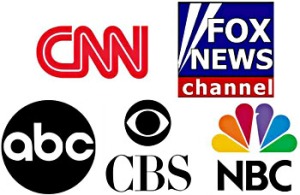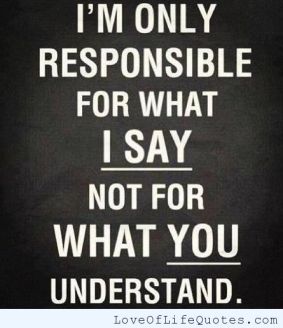
There’s no reason related to the column to post this GIF again, but I just love it so.
From funnycutepics.com.
The unseasonably cool weather at the end of last week was refreshing and welcome, but it gave me a bit of writer’s block.
OK, more like “I have no urge to write” block, and then “I can’t write because I’m too busy scratching mosquito bites” block.
At least the skeeters ate well. I also now have scientific proof that they prefer my right leg about two to one (and I can highly recommend Anti Monkey Butt powder in conjunction with Benadryl and Cortizone … relief!).
Therefore, I’m always happy when readers suggest topics to address.
I’d take my cat’s suggestions, but I doubt anyone wants to read about catnip and laser toys, plus his point of view on dogs (and squirrels talking smack) is highly suspect.

Shhh … don’t anyone tell Fox News that it’s part of the mainstream media. Image from MotherJones.com.
George Aldrich asks about R words used frequently in editorials and letters—reputable, reliable, etc.—citing specifically another reader’s letter invoking “responsible media outlets.” He believes that reader’s definition of “responsible” likely means “conservative-leaning.”
I’d say he’s probably right.
Sponsored by letter R
Would love to see either Paul Greenberg or Brenda Looper do a column to clarify the meaning of frequent R words that appear in editorials or letters: reputable, reliable, responsible, reputed, and reproach (as in “beyond”).
For example, in the “broken borders” letter from Mr. David Bryant, we read: “Now we learn, from a few responsible media outlets …” From the general tone of the letter, “responsible media outlets” could be any one or more of numerous conservative- leaning sources including Fox News, the Heritage Foundation, the Republican National Committee, Washington Times, etc.
In another letter, “responsible media outlets” could be any one or more of numerous liberal-leaning sources including MSNBC, The Huffington Post, MoveOn, New York Times, etc. It seems to depend on a writer’s bias as to which media outlet is the most “responsible.”
As suggested in a recent column by Ms. Looper, maybe letter writers should be required to cite their responsible, reputable, reliable or reputed sources or, in Mr. Bryant’s words, “go to the back of the line before they are allowed to write again.”
GEORGE ALDRICH
Hot Springs Village
All righty, George, let’s tackle the specific word “responsible,” which is what Mr. Bryant used. The primary dictionary we use at the paper is Webster’s Collegiate Dictionary, though I consult onelook.com for multiple dictionaries (told you I was a word nerd). Webster’s defines responsible thusly:
“1. expected or obliged to account (for something, to someone); answerable; accountable.
2. involving accountability, obligation, or duties: a responsible position.
3. that can be charged with being the cause, agent, or source of something: the moisture that is responsible for the rust.
4. able to distinguish between right and wrong and to think and act rationally, and hence accountable for one’s behavior.
5. (a) readily assuming obligations, duties, etc.; dependable; reliable; (b) able to pay debts or meet business obligations.”
I think the keywords are “accountable” and “reliable.” Oxford puts it even more simply: “Capable of being trusted.”
 Still, that may differ from person to person. For me, media outlets that stand behind their stories with hard facts rather than speculation and use a wide array of sources and—more importantly—are willing to correct themselves when they get it wrong are to be more trusted. We all get it wrong at some point (I had some strangled language in last week’s column, for example), but if we can’t admit that, we’re missing the point.
Still, that may differ from person to person. For me, media outlets that stand behind their stories with hard facts rather than speculation and use a wide array of sources and—more importantly—are willing to correct themselves when they get it wrong are to be more trusted. We all get it wrong at some point (I had some strangled language in last week’s column, for example), but if we can’t admit that, we’re missing the point.
When “responsible” comes to mean only those outlets that reflect your own point of view, that’s problematic as far as getting a full picture of what’s happening in the world.
However, if you want to cite those sources, go ahead. We call that giving you more rope. But don’t blame us when other readers call you on it and pull on the rope.
From one R word to another—religion. Richard Frothingham suggests that I rethink the policy on Bible verse citations—as I stated several weeks back, the Voices page doesn’t use chapter and verse citations.
Perfection and policy
Editor Paul Greenberg, in a column on perfect sentences, cites as examples the openings of several great novels. Experienced writers do indeed work hard to catch their readers’ attention with their opening lines. I once heard about a professor who told students in a course on creative writing that people want to read about royalty, profanity and sex. Soon one of his students turned in a work of fiction that began with: “‘Damn,’ said the duchess, ‘get your hand off my knee!’”
On another matter, editor Brenda Looper, in a column about policy for the Voices page, states that “[t]he long-running rule on the Voices page is that we don’t publish Bible verse citations.” Then she seems to contradict herself, writing, “We’ll let you put in a short quote or paraphrase.” How can she do that without violating the rule? Perhaps the rule should be restated to the effect that she will not publish lengthy biblical passages.
I would urge her to change that policy, for three good reasons. First, citing chapter and verse equips readers to confirm that what purports to be a biblical citation really does come from that source. I know of several Internet sites dealing with numerous sayings that are commonly but mistakenly regarded as biblical. Second, providing chapter and verse permits readers to study passages in their wider biblical contexts, enhancing our understanding and appreciation of them. Third, with the use of standard contractions, citing chapter and verse does not take up much space in the paper.
RICHARD FROTHINGHAM
Little Rock
Mr. Frothingham mistakenly believes I contradicted myself by saying I’d allow a short quote or paraphrase. However, a full chapter and verse citation would be something like this: “For God so loved the world that he gave his only begotten son, that whosoever believeth in him shall not perish, but have eternal life,” John 3:16. The chapter and verse citation is only that little bit at the end; the bit in quotes is just the verse.
I understand his reasoning, and space isn’t really the issue (though that “John 3:16” does take up space that could be better used making your argument). As I’ve said before, the Voices page isn’t the Religion section, even though there have been complaints of it becoming that—it’s a delicate balance to maintain at times. It’s also not Bible study, Bible Bowl or Sunday School, or a big game of “Gotcha.”
Most people interested in the religion letters are going to know where in the Bible those verses originated, and those who aren’t sure can—if they’re so inclined—head to sites like BibleGateway.com that have keyword and verse searches as well as multiple translations for comparison and contrast. The site just did a redesign which I have yet to try out, but also has a link to its old site (which I always thought was just fine).
The Bible is, quite honestly, one of the easiest sources to check, whether online or in the printed version (give that concordance a workout). Of course, if someone cites something from one of the seven additional books in the Catholic Bible or something from the “lost books” and heads start exploding, that’s not on me. OK, the “lost books” thing is. Right now, there are people twitching to try to keep from exploding. I need the amusement sometimes.
I’ve always believed knowledge isn’t just handed to you—you have to work for it, and those who are interested will do the work. Back in my freshman year in college, a friend and I on my dorm floor had a philosophy class together. We would have study sessions for tests, but she’d spend an awful lot of time instead praying for God to help her pass the test. I’ve always been of the mind that God gave us brains, but won’t do our thinking for us; we have to do the work with the tools we’re given.
That kind of hunger for knowledge is a good thing, and it hurts nothing to encourage it. Using the citations, though, would only encourage more letters like a recent one (unpublished) that was nothing but a list of verses.
We’re a nation of many religions, not just the many flavors of Christianity, and allowing full Bible citations would mean we’d need to extend that policy to all other religious texts. I have a very strong feeling that that would not meet with a positive response from quite a few people who don’t believe in those other sacred texts. I’m already anticipating indignant responses from some of our more reactionary readers.
Put this in the category of “not going there.”



Thanks for posting the penguins again. Can’t have too many smiles in my day.
“Responsible media” is becoming an oxymoron. Back in the golden years of journalism, fact, opinion, and “sponsored content” were clearly distinguished. These days they’ve become so intermingled that picking out the facts is difficult, if not impossible.
LikeLike
I live to please. 😉
That’s so true, which is why it disturbs me so much when people take at face value anything told to them by their favored source without checking its veracity, so much so that those who more successfully avoid partisanship are ignored because of it.
LikeLike
Are you serious about the Anti Monkey Butt powder? Chiggers are eating me alive. Also, your blog post title reminds me of Sesame Street, and that makes me smile. The theme song is going through my head.
A friend and I were discussing editing, writing, and responsible journalism earlier today. . Our conversation was more about how the 24-hour news cycle contributes to inaccurate reporting. She argued that the media is more concerned about reporting information fast rather than accurate. I remember when I heard on NPR that Gabby Giffords had died. That information was retracted but not before traumatizing her family (Gabby – A Story of Courage and Hope, pp. 170-172). All news outlets need to verify sources and information before reporting.
Thank you for sharing your thoughts on responsibility and religion. I would also love to read Luke’s thoughts about dogs.
This comment is brought to you by the letter V as in verify. I have included Antil Monkey Butt powder on my grocery list.
LikeLike
Please excuse my typos. It’s been a long weekend.
LikeLike
Hee! I’m playing Candy Crush at the same time. I’m lucky actual words are coming out. 😀
LikeLike
😀 Sunny day, chasin’ the clouds away …
Anti Monkey Butt Powder (I found it in the foot-care aisle at Wally World) is a marvel. I had already slathered myself with Cortizone, which was helping, but not enough. The mosquitoes had actually raised some welts! After I put the powder all over my legs (just on a lark), it felt soooooo much better, so I can highly recommend it. I also found calamine spray, which could help as well.
You’re so right about the inaccurate reporting out there (we can easily compare the way the Giffords shooting was handled with how the JFK assassination was handled.) The 24-hour cycle plus the Internet is a recipe for disaster.
Luke’s thoughts on dogs today are pretty much, “Why won’t that dumb dog across the way shut up??” And there was a little growling. 🙂
LikeLike
Charlie feels the same way about dogs, but he is stuck with our lhasa poo, Josie. She knows that Charlie is the boss, though, so he sucks it up and leaves her alone. Every now and then he tries to groom her or he shows her his kitty ninja moves. Josie is nine years old and a good sport.
I put Anti Monkey Butt powder on my grocery list and then forgot the list. I did well to remember the milk and other basic necessities. I’ll look for it when I make another Kroger run later today.Thanks for the tip.
I’m at the point of doubting all news, not just articles from blogs or non-mainstream media. I need to find a balance my cynicism with a more practical outlook. Besides, I read recently that a study shows that cynical people are more likely to get dementia later (that is an article I will research further).
LikeLike
Even when I remember the list, I still forget at least one or two things!
Especially in the past decade or so, I’ve taken on the “trust but verify” mentality with most things I hear that aren’t obviously opinion. Cynical, yes, but needed when so many people fudge the details.
There’s also an old study out there that says people born in the winter are more likely to have schizophrenia than those born in other seasons (because the pivotal trimester for brain development is during hot summer months). Considering that, the bulk of my family is crazy. 😉 and my brothers and I were all born in January, so we’re kinda screwed.
LikeLike
…”On my way to where the air is clean…”
LikeLike